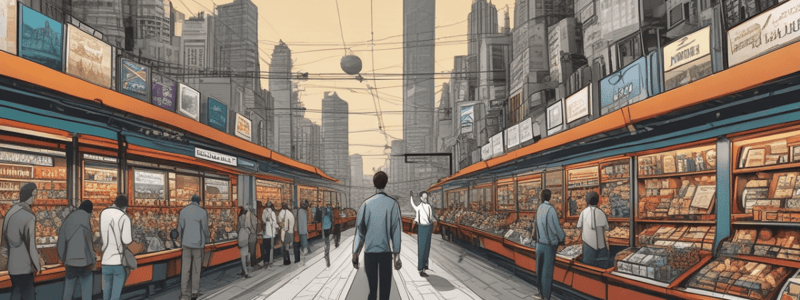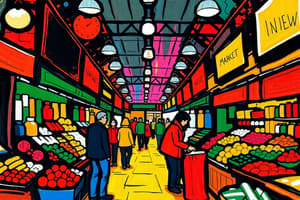Podcast
Questions and Answers
What type of demand refers to the quantity demanded of a good or service by individual consumers at different prices?
What type of demand refers to the quantity demanded of a good or service by individual consumers at different prices?
Individual Demand
What is the term for the demand for a factor of production, not for its own sake, but for its use in the production of other goods?
What is the term for the demand for a factor of production, not for its own sake, but for its use in the production of other goods?
Derived Demand
What type of demand occurs when goods have more than one use, and an increase in demand for one product can result in a fall in supply for another?
What type of demand occurs when goods have more than one use, and an increase in demand for one product can result in a fall in supply for another?
Composite Demand
What is the term for demand that is supported by the necessary purchasing power, referring to the willingness and ability of consumers to purchase goods/services at different prices?
What is the term for demand that is supported by the necessary purchasing power, referring to the willingness and ability of consumers to purchase goods/services at different prices?
What is a table that gives the quantities of a good/service that would be demanded by consumers at different prices?
What is a table that gives the quantities of a good/service that would be demanded by consumers at different prices?
What type of goods are considered exceptional because a price increase leads to an increase in consumption, as high prices make them more attractive to those who can afford them?
What type of goods are considered exceptional because a price increase leads to an increase in consumption, as high prices make them more attractive to those who can afford them?
Which type of goods are essential items with little to no substitutes, where a price rise leads to an increase in demand among low-income consumers?
Which type of goods are essential items with little to no substitutes, where a price rise leads to an increase in demand among low-income consumers?
What is the term for goods whose demand is influenced by consumer expectations, such as delaying a purchase in anticipation of a future price drop?
What is the term for goods whose demand is influenced by consumer expectations, such as delaying a purchase in anticipation of a future price drop?
What is an example of a Giffen good, where the price increase led to an increase in demand among low-income consumers in the 1800s?
What is an example of a Giffen good, where the price increase led to an increase in demand among low-income consumers in the 1800s?
How do expectations influence the demand for goods, such as property, when prices are falling?
How do expectations influence the demand for goods, such as property, when prices are falling?
What is the effect of a rise in income on the demand for a normal good?
What is the effect of a rise in income on the demand for a normal good?
What happens to the demand for a good when the price of its substitute increases?
What happens to the demand for a good when the price of its substitute increases?
How does negative publicity affect the demand for a good?
How does negative publicity affect the demand for a good?
What is the effect of a belief that prices will be higher in the future on the demand for a good?
What is the effect of a belief that prices will be higher in the future on the demand for a good?
What is the effect of an increase in population on the demand for a good?
What is the effect of an increase in population on the demand for a good?
What happens to the quantity demanded of a good or service when its price falls, according to the Law of Demand?
What happens to the quantity demanded of a good or service when its price falls, according to the Law of Demand?
What is the relationship between the price of a good or service and the quantity supplied, according to the Law of Supply?
What is the relationship between the price of a good or service and the quantity supplied, according to the Law of Supply?
What happens to the quantity supplied of a good or service when its price rises, according to the Law of Supply?
What happens to the quantity supplied of a good or service when its price rises, according to the Law of Supply?
What is the direction of the change in quantity demanded when the price of a good or service increases, according to the Law of Demand?
What is the direction of the change in quantity demanded when the price of a good or service increases, according to the Law of Demand?
What is the effect of a decrease in the price of a good or service on the quantity supplied, according to the Law of Supply?
What is the effect of a decrease in the price of a good or service on the quantity supplied, according to the Law of Supply?
What is an example of a situation where the supply of a good or service is fixed, making it perfectly inelastic?
What is an example of a situation where the supply of a good or service is fixed, making it perfectly inelastic?
Under what circumstances can a supplier initially increase the quantity supplied in response to a price rise?
Under what circumstances can a supplier initially increase the quantity supplied in response to a price rise?
What is the term for the aggregate quantity supplied of a good or service by all suppliers in a market at different prices?
What is the term for the aggregate quantity supplied of a good or service by all suppliers in a market at different prices?
What is the term for the quantity of a good or service supplied by an individual supplier at different prices?
What is the term for the quantity of a good or service supplied by an individual supplier at different prices?
What is the characteristic of supply in a situation where the supplier is operating close to maximum capacity?
What is the characteristic of supply in a situation where the supplier is operating close to maximum capacity?
Flashcards are hidden until you start studying
Study Notes
Types of Demand
- Individual Demand: The quantity of a good or service demanded by individual consumers at different prices.
Market Demand
- The aggregate quantity of a good or service that would be demanded by all consumers at different prices.
Derived Demand
- Applies to factors of production, where demand is for a good not for its own sake, but for its use in producing other goods.
Composite Demand
- Applies to goods with more than one use, where an increase in demand for one product can result in a fall in supply for another.
Joint Demand
- Refers to complementary goods that are bought and sold together, such as fish and chips.
Effective Demand
- Demand that is supported by the necessary purchasing power, referring to the willingness and ability of consumers to purchase goods/services at different prices.
Demand Schedule
- A table that shows the quantities of a good/service that would be demanded by consumers at different prices.
Types of Demand
- Individual Demand: The quantity of a good or service demanded by individual consumers at different prices.
Market Demand
- The aggregate quantity of a good or service that would be demanded by all consumers at different prices.
Derived Demand
- Applies to factors of production, where demand is for a good not for its own sake, but for its use in producing other goods.
Composite Demand
- Applies to goods with more than one use, where an increase in demand for one product can result in a fall in supply for another.
Joint Demand
- Refers to complementary goods that are bought and sold together, such as fish and chips.
Effective Demand
- Demand that is supported by the necessary purchasing power, referring to the willingness and ability of consumers to purchase goods/services at different prices.
Demand Schedule
- A table that shows the quantities of a good/service that would be demanded by consumers at different prices.
Exceptions to the Law of Demand
- Snob Goods/Veblen Goods: High prices make them attractive to those who can afford them, which could lead to an increase in consumption when prices rise.
- Giffen Goods: Essential items with few or no substitutes, primarily purchased by low-income individuals, leading to an increase in demand when prices rise, as seen in the 1800s with bread replacing meat as a staple food.
- Goods affected by expectations: Demand is influenced by future price expectations, such as in the housing market, where consumers may delay purchases when prices begin to fall, anticipating further declines.
Factors Causing a Shift in Demand
- Income affects demand differently for normal and inferior goods: normal goods see an increase in demand when income rises, while inferior goods see a decrease in demand.
- Substitutes, goods that satisfy the same needs, can affect demand: an increase in the price of substitutes can lead to an increase in demand for the original good, and vice versa.
- Complements, goods bought and sold together, can also affect demand: a change in the price of a complement can lead to a change in demand for the related good.
- Advertising and consumer preferences can influence demand: negative publicity can decrease demand, while positive publicity can increase demand.
- Future expectations can shift demand: if consumers expect lower prices in the future, they may delay purchases, leading to a leftward shift in demand; if they expect higher prices or shortages, they may accelerate purchases, leading to a rightward shift.
- Changes in population or market size can impact demand: an increase in emigration, for example, can lead to a decrease in demand for public transport.
- Availability of credit can affect demand: high availability of credit can lead to increased demand.
- Unplanned factors, such as good weather, can also influence demand: good weather, for example, can lead to an increase in demand for ice cream.
The Law of Demand
- As the price of a good or service decreases, the quantity demanded increases.
- Conversely, when the price of a good or service increases, the quantity demanded decreases.
The Law of Supply
- A direct relationship exists between the price of a good or service and the quantity supplied.
- As the price of a good or service increases, the quantity supplied also increases.
- Similarly, when the price of a good or service decreases, the quantity supplied decreases.
Exceptions to the Law of Supply
- Supply is fixed when a seller cannot change the quantity supplied in response to a price change, such as a concert venue with a fixed number of seats.
- In this scenario, supply is perfectly inelastic, meaning that a change in price does not affect the quantity supplied.
Operating Close to Maximum Capacity
- When a supplier is operating close to maximum capacity, they can initially increase the quantity supplied in response to a price rise.
- Example: A factory producing PPE gear during Covid-19 could increase production from 5 to 7 days a week in response to a price increase.
Definitions
- Individual Supply: The quantity of a good or service supplied by an individual supplier at different prices.
- Market Supply: The total quantity of a good or service supplied by all suppliers in a market at different prices, aggregating individual supplies.
Studying That Suits You
Use AI to generate personalized quizzes and flashcards to suit your learning preferences.




